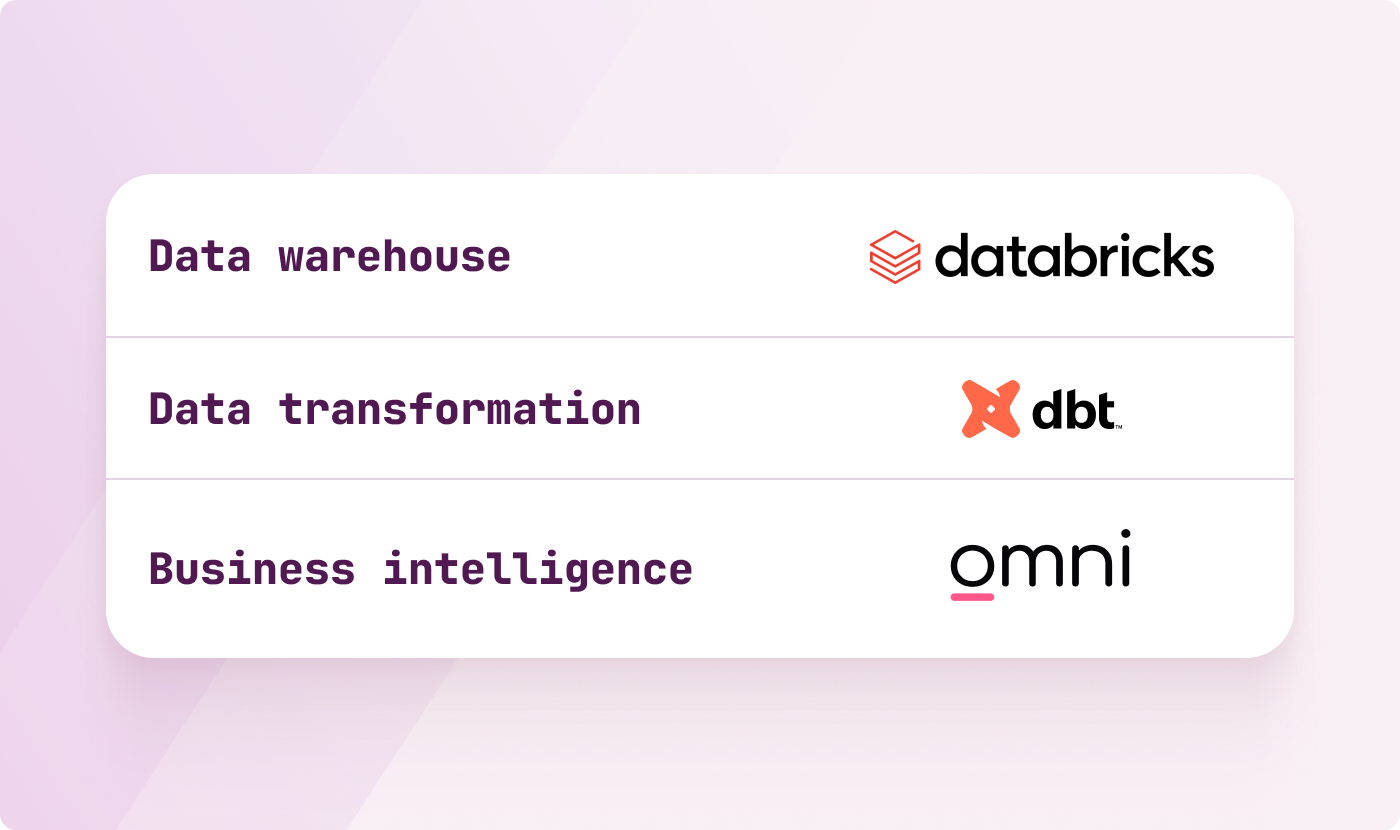
Ordermentum is transforming how Australia’s hospitality industry operates. As the country’s leading ordering and payments platform for food and beverage, they facilitate billions of dollars in transactions across over 45,000 venues and 1,000 suppliers. This rich foundation of data on orders, payments, and customer behavior has the potential to help customers drive smarter decisions at every level of their business.
To unlock this value, Ordermentum’s team set out to modernize their data strategy to improve internal self-service and help clients reach better decisions faster.
Mitchell Hayes, Data Product Manager, led the initiative. “We were looking for a unicorn — one platform that could handle power users while still being friendly enough for folks who just know Excel or want to use natural language. Omni gave us all that, and more.”
In under two months, they consolidated internal and embedded analytics use cases from Metabase, Tableau, and Looker into Omni. The result? A dramatically simpler BI stack for their lean data team to manage and a faster path to self-service and AI-powered insights for all their users.
Results #
Consolidated internal and embedded analytics from Metabase, Tableau, and Looker into Omni in under 2 months
Enabled company-wide self-service with SQL for technical users, Excel workflows for business users, and AI for natural language queries
Reduced ad-hoc data team requests and cut dashboard duplication by 50% using Omni’s dynamic filters
Data Stack #

The Challenge #
As Ordermentum scaled, so did their reporting challenges.
Internal teams were stuck between Metabase and Tableau. With Metabase, users faced slow results and technical barriers to entry, both of which created bottlenecks. “You need a technical understanding of data to use Metabase. Our Head of Sales came to me to ask how to join two tables together; they shouldn’t need to know that,” explains Mitchell. “People should just be able to get the numbers they need. I knew we needed a central data model to provide self-service.”
Tableau was an artifact of a previous acquisition. It was expensive, didn’t meet the needs of the broader team, and fell behind in product development. “We don't love the lack of innovation from big companies. We wanted someone who would grow with us and move quickly. We knew AI was going to be big and wanted someone who would innovate there — that’s not likely with a big vendor.”
The team also used Looker for their customer-facing product but lacked the time and expertise to maintain it. “The Looker product hasn’t progressed in a long time, and we wanted our product managers focused on building our product — not learning LookML,” adds Mitchell.
“We had three BI tools. None of them served everyone well, and they all came with baggage — cost, performance, and usability.”Mitchell Hayes, Data Product Manager
To simplify their data environment and better meet the needs of internal and external users, Ordermentum set out to evaluate new platforms for their data stack.
Migrating to Databricks #
Investing in a new BI platform also meant investing in a modern, scalable data warehouse to support it. For example, Ordermentum’s largest and most important table, line_items, frequently timed out in Postgres. “We’re a marketplace — orders and products are our business. The line_items table is huge, and Postgres just couldn’t handle it,” Mitchell explains.
As their data volumes grew, scaling read replicas proved costly and ineffective. Databricks offered a better path: serverless infrastructure, scalable compute, and strong support for advanced workflows.
“We picked Databricks to avoid infrastructure headaches. It’s plug-and-play, and it can abstract away a lot of the complexities that we don’t have time to build or manage.”Mitchell Hayes, Data Product Manager
The BI Evaluation Process #
With Databricks set up, the team now focused on finding a BI platform that met their key criteria:
Seamless Databricks integration and low infrastructure overhead
One platform for internal and embedded use cases
Friendly, flexible self-service:
SQL for advanced users
Excel parity for spreadsheet-first users
AI for natural language exploration
Strong governance for securely scaling consistent metrics across users
A compelling roadmap and fast product velocity
Mitchell and the team evaluated a wide range of tools, including Hex and ThoughtSpot. They also re-evaluated Metabase on top of Databricks. But none could balance the flexibility needed to serve various users with the governance to ensure metric consistency and accurate permissions.
“The Excel functions really drew us to Omni. I used to build Metabase dashboards that took forever to load, and people would just export them and pivot in Excel. Most BI tools can’t compete with that, but it’s what most people need. When people export, the data gets outdated, hard to track, and impossible to manage. Now they can do everything they need to do in Omni, and we don’t need to worry about performance or managing exports or versions.”Mitchell Hayes, Data Product Manager
After testing Omni, it was clear the platform could meet their criteria and more. It would help them consolidate their existing BI tools, streamline internal workflows, reduce maintenance, and support every user’s needs.
“Omni gives us full control for SQL users without slowing them down. And it feels approachable for folks who think in Excel. We can finally serve everyone with one platform.”Mitchell Hayes, Data Product Manager
The Migration #
With a tight timeline before Looker’s renewal, the team rebuilt their entire embedded analytics product in under two months using Omni — ensuring zero customer disruption.
“We didn’t just migrate 1:1 — we cleaned things up. Dynamic filters to switch between time grains let us consolidate a dozen dashboards into one. Omni is faster to build in and easier to maintain.”Mitchell Hayes, Data Product Manager
Internal migration was just as smooth. Technical users retained SQL access, while business teams got Excel-like pivots, dynamic dashboards, and natural language queries via Omni AI.
The Impact #
Unlocking self-service for power users #
Ordermentum’s growth and engineering teams rely on fast, complex queries. They don’t want to model data – they just wanted to write SQL without fielding questions from less technical employees.
With Omni, they can continue using SQL without needing to model data before running fast, ad-hoc analyses. They can build exactly what they need — without spending time helping users across the business who can’t write SQL.
“I didn’t want to put a brace on our power users. These people are debugging platform issues in real-time. Omni lets them move fast without asking permission.”Mitchell Hayes, Data Product Manager
Excel-savvy users also benefit. Instead of maxing out the row limit on spreadsheets and chasing down the right version of a file, they now get the same pivoting experience right inside of Omni — with none of the limitations.
“Our GM of Venues doesn’t know SQL, but he’s smart and he knows exactly what he needs. Now, he can build it himself. He said implementing Omni was the best thing we've done since he joined the company.”Mitchell Hayes, Data Product Manager
Enabling business users with AI #
Less technical users are able to embrace data, too. In addition to faster dashboards and more consistent, accurate metrics, teams across the business — from sales and marketing to data and operations — now use Omni’s AI assistant, Blobby, to answer questions on the fly.
"Our data team has aligned data properties with the terms we use every day, and now I can just open up Blobby and ask exactly what I’m looking for — like ‘Who were our top suppliers last month based on GMV growth?’ The level of detail is excellent, and honestly, it’s actually fun to use."Sophie Paulin, Chief Marketing Officer
Even data experts use AI to save time. During a recent product planning meeting, Mitchell used Blobby to pull order details — no context-switching, no delays.
“I was in a meeting with our product team, and someone asked a question about recent orders, so I just asked Blobby. We got an immediate answer. I could have gotten that answer several ways, but being able to quickly type in a question in natural language while still being able to follow along and participate in the meeting was pretty amazing.”Mitchell Hayes, Data Product Manager
Before, Mitchell’s team used to get bombarded with data questions and packed office hours. Since switching to Omni, the number of requests has dramatically dropped. Now, requests revolve around more strategic projects or new ideas. “During our recent office hours, almost no one showed up – which is exactly what we hoped for. The only person who did came to tell me they had everything they needed and just wanted to say ‘thanks.’”
Building a better customer experience #
Hundreds of wholesale suppliers — from national retailers to small shops — rely on Ordermentum’s embedded insights product to track sales, identify churn risk, and manage performance. “Most of our customers couldn’t manage their own data warehouse; we’re their only option. We knew there was an opportunity to offer deeper analyses for customers with more complex questions, but it was hard to add new reports in Looker,” says Mitchell.
Previously, customers had to select between different dashboard configurations at signup — for example, they had to decide between viewing transactions by order date or delivery date, and seeing revenue metrics with or without tax. The only way to support this process was by maintaining duplicate dashboards, doubling the maintenance required.
Now, the team is expanding its offering to add new dashboards, customization options, and even AI-powered chat for customers. Omni's flexibility has enabled the team to move faster, serve more use cases, and reduce the number of dashboards they maintain by half.
“We used to be afraid to touch anything. Now with Omni, we’re confident jumping in. We feel like we can improve everything.” Mitchell Hayes, Data Product Manager